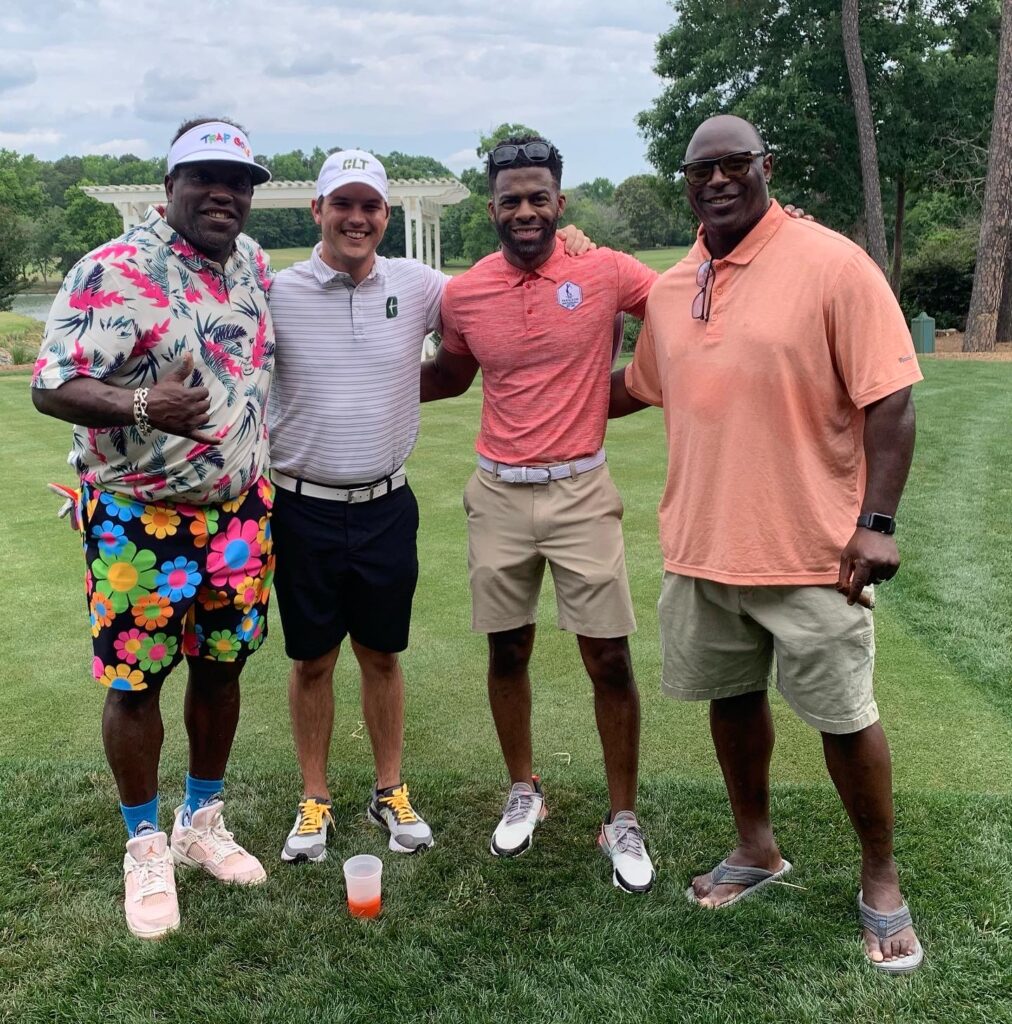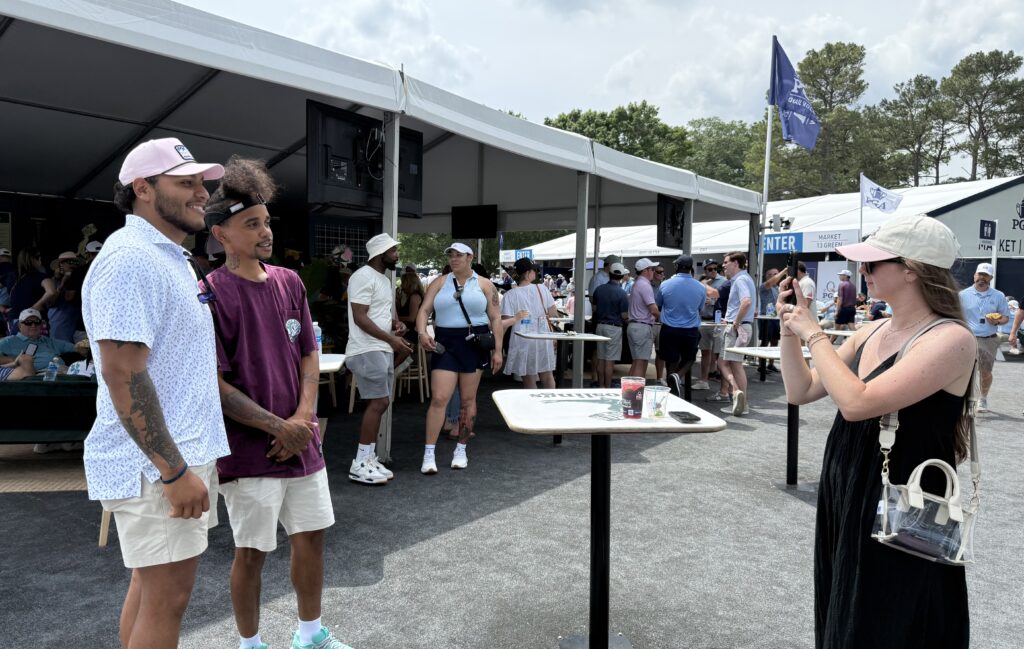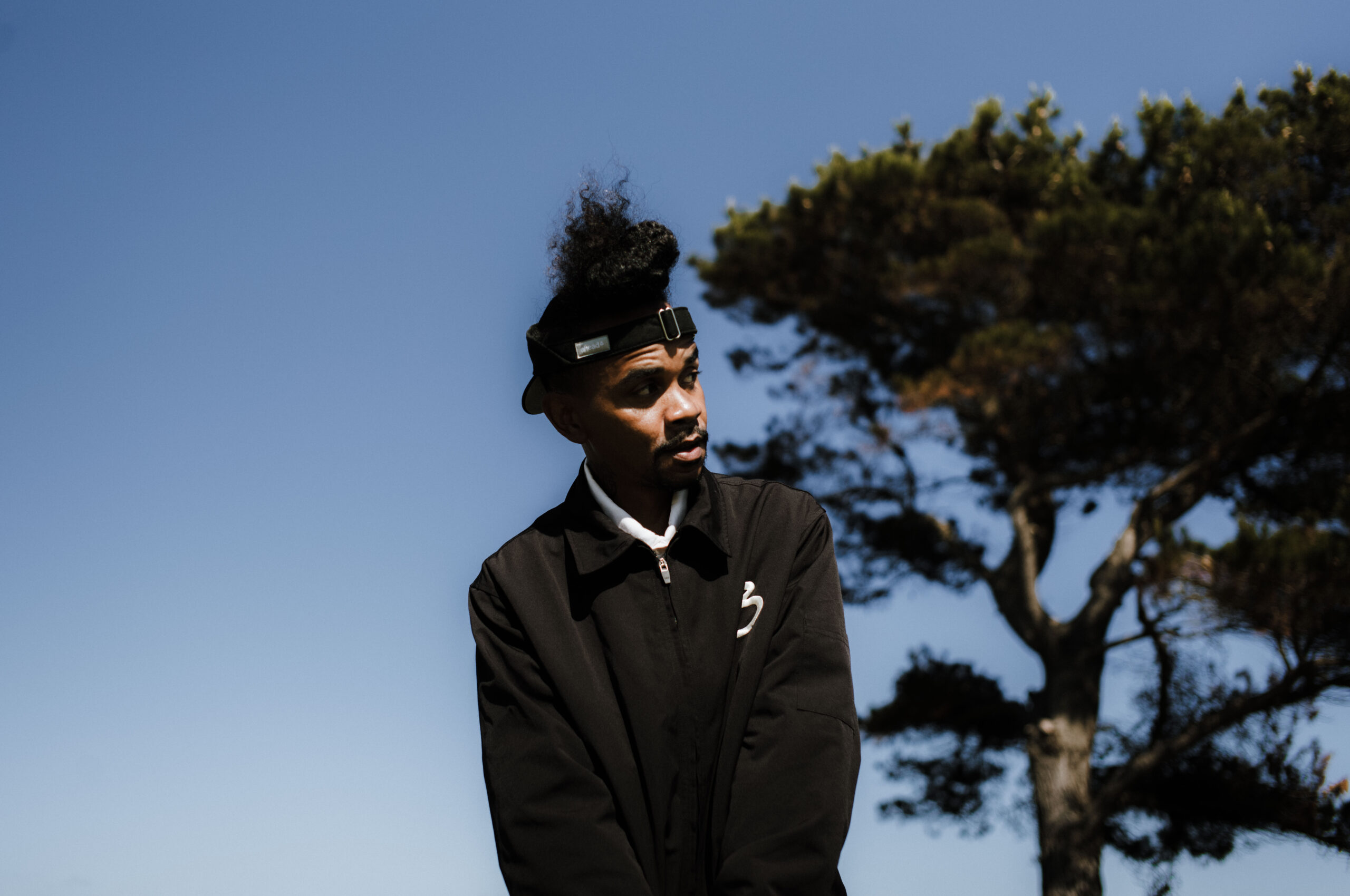A few days after a national podcaster called Charlotte “vanilla,” and six miles away from the seriousness of the PGA Championship, a South End event venue filled up Wednesday night with OT Yeller and Austin Action and a bunch of celebrities from the golf otherworld.
Music thumped. Liquor flowed. Tattoos lined arms and necks. Four golf simulators were busy getting pelted by golf shots that ranged from alright to atrocious. The dress code was whatever, with tucked-in polos beside Street Fighter tees beside floral dresses. Ages ranged from 20s to 70s; race ran the spectrum. I even met two strangers who’d flown in from Baltimore, and we had a spirit-lifting gripe session about our last-place Orioles.
We were all here to be in the orbit of Charlotte’s Erick “OG Lott” Lottary, one of the most famous ordinary golfers in America.
Lottary is a 38-year-old artist and father of two who lives in east Charlotte and spent years making a living all different ways — rapping, delivering newspapers, bartending at Cantina 1511, selling vacuums door-to-door — before he picked up a golf club and an iPhone in January 2023 and made a video with voiceover commentary just to, as he puts it, “clown on my homies.”
Two years later, he and those homies are heroes for the nation’s hackers.
They’ve created their own golf language. A bogey is a “Muggsy,” after Hornets legend Muggsy Bogues. Birdie is “hot wings.” And a double bogey is a “dollar menu,” because OG Lott used to eat a lot of McDonald’s and, “in my time the biggest thing on the dollar menu was a double cheeseburger.”
With each video Lottary posts to his 300,000-plus Instagram followers, he’s helping to grow a sport that a half-decade ago was enduring retraction and soul-searching. His audience includes everyone from executives to line cooks, professional golfers to construction workers.
He’s done for them what no marketing campaign or outreach program could do — he’s made golf not only accessible, but something they aren’t ashamed to play.
“They saw something in me they wanted for themselves,” Lottary told me. “I’m a big fan of trying to help the New Age of golf.
“Golf has been big a long time, but it’s only been big to certain people. So for inner-city kids or even, quote, ‘trailer-park kids’ to say, ‘I wanna be like Big Lott,’ it’s just crazy.”
I went to meet Lottary because I’ve followed his videos for a couple of years. No idea how I came across them, but I remember laughing when I heard him celebrate a “Muggsy,” and I remember that when I sent that video to the actual Muggsy Bogues, he responded simply, “My guy.”
I also wanted to ask Lottary about the “vanilla” commentary circling his city, after the much-discussed No Laying Up remarks, because Lottary may be a lot of things but vanilla isn’t one.
There were a number of other news matters in the city last week — the golf championship, Shakira, the ongoing police chief saga, the vacant council seat, ICE operations carried out in public spaces, conspiracy theories around the Hornets’ bad draft luck — but somehow thin national perceptions of the city kept bobbing on the surface.
It’s a Charlotte kinda thing to worry over something like this without reflecting on what we’ve done to enable those criticisms. Immediately people fired off predictable rebuttals, like restaurant recommendations and things to do.
But a city’s reputation is about more than what it offers to purchase and consume; it’s about the stories it holds up. The “bland” quip is more of a branding problem than a cultural reality.
Golf has long mirrored the rules for what’s elevated in American cities — who belongs, who leads, who gets seen. In Charlotte, Lottary and others are taking swings to evolve those rules, showcasing the richness of the game’s present and its overlooked past here. And they’re doing it as a joyful, pointed challenge to the idea that Charlotte is too vanilla to surprise people.

Let’s stick with golf, the playing field for the disagreement.
A national appetizer story last week could’ve been one about how Charlotte led the way in integrating the game a half-century ago, and now it’s a leader in expanding and diversifying its future. Instead we were fending off “diet Atlanta” and “Kardashian” snark.
Here’s something: Mecklenburg County’s four municipal courses have seen an increase of about 12% in rounds in the past 15 months, according to Troon, which took over operations in 2023.
Black golfers are a big reason. Several new organizations have popped up, along with the growing online influence of people like Lottary and former Panthers star Jonathan Stewart, to invest in making the game more inviting to people who might’ve found it, well, vanilla.
Chris Word started his golf community, Greenwood Golf, in 2021. Greenwood members get everything from weekly rounds to a session with a wealth adviser. Greenwood also hosts the annual Juneteenth Golf Classic, which this year will raise money for the Johnson C. Smith golf team.
Word says he’s a champion of the “weekend warriors.” He surveyed area clubs recently and estimates that Charlotte has a little more than 700 Black golfers, men and women, who play at least once a week in non-country club settings.
Golf popularity is up across the board, with about 28.1 million people playing a round in 2024, the most since 2008, according to the National Golf Foundation. Two of the main drivers are women (who made up 28% of all golfers in 2024) and people from Black, Hispanic or Asian backgrounds (25% of all golfers, the highest proportion ever recorded).
“The face of golf may have changed more in the past five years than the previous 50,” the NGF wrote.


Five years ago, Yandrick Paraison worried about putting his face on marketing material for a golf tournament he was launching, for fear of turning off potential sponsors.
His longtime friend and assistant county manager Anthony Trotman convinced him to put those fears aside.
“Go with your name,” Trotman told Paraison. “Some people will take to you and some people won’t. But be confident in who you are.”
On May 31, Paraison, who only seriously began playing golf in 2020, will host the fifth annual Paraison Invitational Golf Tournament at Emerald Lake. His sponsor list includes big corporations and small businesses, and he holds a “Diversity in Sports” forum featuring executives from pro sports teams. The Paraison has become an annual showcase of Black success. And joy.
Last year the carts were filled with names of corporate leaders, former pro athletes, and young entrepreneurs. And each year, after the golf is over, the Paraison launches into an afternoon day party where non-golfing local notables show up. Last year the mayor was there.
“It’s like another world that isn’t represented and isn’t talked about enough,” Paraison told me. “In my five years of doing this, I’ve been exposed to so many brown and Black golfers and have heard so many legendary stories.”

No place showcases those stories better than the public course just south of uptown named for Charlotte native Charles Sifford. In 1951, the course was an all-white venue named Bonnie Brae when a group of civil rights leaders tried to play and were turned away. They petitioned the local parks commission, and a judge ruled in their favor, ending segregated golf here.
In 1960, Sifford, a World War II veteran, became the so-called “Jackie Robinson of golf” when he was the first Black player on the PGA Tour. He was honored with the Presidential Medal of Freedom before his death in 2015.
Now the former Bonnie Brae course is a nine-hole public course that bears Sifford’s name.
James Black was a longtime regular there. He joined the PGA Tour in 1964 and became the first Black player to ever hold a lead at the end of a full round at a Tour event, according to the Observer. Until his death at 81 in 2023, Black could often be found at the Sifford course with other old-timers. Many are still there, carrying on the conversation.
“They just hang out there,” Paraison says. “And they will whip your ass.”
Word, the Greenwood Golf founder, thinks that if Charlotte leaned into that Sifford story and others like it, perceptions of the city wouldn’t be as shallow.
“Make the Sifford golf course a monument — like, make that a tourist attraction,” Word says. “Sell that idea that Charlotte integrated golf. That this is where that story started. Because people don’t know. And if you don’t know, you go with what’s accessible, and then you get comments like ‘vanilla.’”


“Mind if I get a picture?” people kept asking Erick Lottary on Thursday. It was the day after his big event in South End, and now he was sitting at a rum bar in a sprawling concessions area near the 13th green at Quail Hollow.
Sponsors offered him drinks without prompt. Strangers gave him hugs. His fans didn’t fit neatly into any bucket: “You wouldn’t believe how many older white men are just in love with what we are doing,” he told me.
Lottary’s turned his fame into a golf brand, RNG Golf, with apparel and shirts that say “Real.” It’s helped take him all over the world. He spent six days in Ireland earlier this month.
The PGA content team’s invited him to create video blogs with some professionals, including Rickie Fowler. When Fowler hit a bunker shot, Lottary’s call was, “Slick Rick, from Myrtle Beach!”
Fowler actually wore an RNG Golf hat to Quail Hollow this week.
Even Lottary’s kids, 11 and 9, are starting to understand how famous their father has become. One morning last year, he was waiting in the school drop-off line when a police officer approached his car and asked him to roll down his window. Lottary’s initial reaction was to ask what he’d done wrong. No need.
“Big Lott!” the uniformed officer said. “I love your channel. Us here at the Mint Hill PD, we all watch.”
Still he runs into walls. On the front nine of a recent round at a south Charlotte country club, a marshal told him some members had complained about him violating the dress code. He wears his visor backward, he says, to protect his neck from sunburn, and wears his shirt untucked because he doesn’t like the way sweat pools at his beltline. He left after nine holes. No hard feelings. No grudges.
“End of the day, I was like … if that’s how you want to treat me, I won’t come back,” Lottary said. “You’ll do fine without me, and I’ll do fine without you. And that’s OK.”
And that’s the approach he took to the “vanilla” commentary, when I brought it up.
Lottary knows the No Laying Up personalities and is “cool with them” so he just wanted to “let it live.”
But he had some things to say.
“That’s how you feel about Charlotte? Cool.” Lottary said of his reaction. (And here’s where I should say, to those who don’t follow him, that Lottary cusses a good bit.) “I don’t give a fuck. Don’t come. You ain’t gotta come here. That’s how I treat everything. … I allow people to have their opinions, bro. However you feel about me, however you feel about my city, however you feel about how I play golf, I don’t care.”
He kept going.
“That’s like when people tell me, ‘Oh you only hit that drive like 190 (yards)!’ It’s like, ‘It’s in the fairway, ain’t it? What, you want me to throw my back out trying to impress you?’”
And that, coming from a Charlottean, hit me as most refreshing.
Subscribe to The Charlotte Optimist
Connections in this story:
Paraison Invitational: hello@paraisoninvitational.com
Greenwood Golf: info@greenwood.golf
